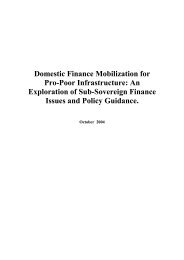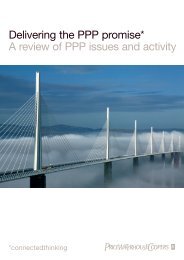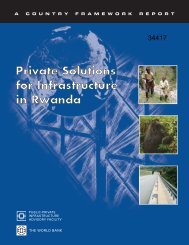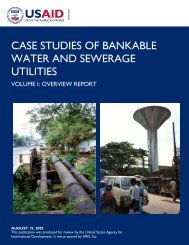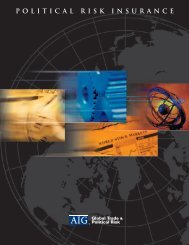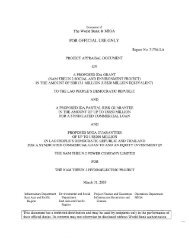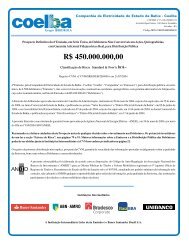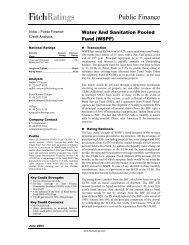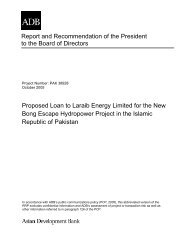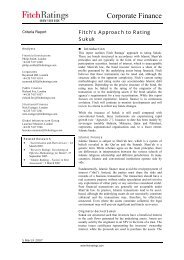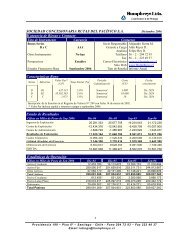EAP - The Pacific Infrastructure Challenge - World Bank (2006).pdf
EAP - The Pacific Infrastructure Challenge - World Bank (2006).pdf
EAP - The Pacific Infrastructure Challenge - World Bank (2006).pdf
You also want an ePaper? Increase the reach of your titles
YUMPU automatically turns print PDFs into web optimized ePapers that Google loves.
different, some efficiency may be gained from coordinating tender preparation,<br />
selection and contract monitoring activities across the sectors.<br />
Outer islands development is another area that would benefit from infrastructure<br />
coordination. Most <strong>Pacific</strong> countries have prioritized increasing infrastructure access<br />
to outer islands, but utilities in each sector have individual universal access targets<br />
and none of the utilities interviewed reported planning, prioritizing or implementing<br />
expanded access to their services in conjunction with other utilities. It would also be<br />
sensible to coordinate extending transport, electricity and water with plans for outer<br />
island tourism, health or education development<br />
5) Ineffective coordination between public and private sector roles and responsibilities: <strong>The</strong> private<br />
sector needs to know what role the country’s government wants it to play. <strong>The</strong> policy<br />
framework and the processes which flow from that framework need to be<br />
transparent to allow it to respond properly. Lack of coordination in <strong>Pacific</strong> countries<br />
reduces the effectiveness of private participation in infrastructure, if for no other<br />
reason than private providers face considerable uncertainty. <strong>The</strong> implications of an<br />
uncertain government policy framework are considerable. For example: the risk<br />
premium built into pricing will be higher to cover the costs of getting things wrong;<br />
there is likely to be more expensive litigation as providers try to get certainty through<br />
the Courts (and this can be a problem in itself where the court system in a country is<br />
weak); and considerable management time can be wasted on arguing with officials or<br />
politicians about the meaning of an opaque government policy rather than<br />
concentrating on improving the efficiency of the infrastructure business for the<br />
benefit of consumers and taxpayers. This simply makes for low efficiency and higher<br />
costs for consumers and the government.<br />
<strong>The</strong> attempt to privatize Telikom PNG Ltd (Telikom) illustrates this point. <strong>The</strong> sale<br />
has been embroiled in controversy since Telikom’s Board switched from negotiating<br />
with Fiji Telecom, the preferred buyer, to Econet. Econet paid for 51% of the<br />
company when the Telikom Board undertook to reassess the value of Telikom’s<br />
assets without the knowledge of the government team, headed by the Independent<br />
Public Business Corporation (IPBC), a body established to head the privatization<br />
process. <strong>The</strong> Board justified this on the basis that proper due diligence had not been<br />
carried out on Econet prior to finalizing the contract. This represents a loss of faith<br />
in the privatization body and a breakdown in communication between it and the<br />
Board. This has resulted in none of the bidders knowing which is preferred and all<br />
parties uncertain whether bids and the final deal will hold.<br />
6) <strong>Challenge</strong>s for regional and national level coordination: A number of regional initiatives have<br />
been proposed in the <strong>Pacific</strong> to help smaller countries overcome capacity and scale<br />
issues, but some have stalled or implementation has been delayed, often due to<br />
concerns about sovereignty or a lack of clarity on how individual country needs would<br />
be met in practice.<br />
For example, the <strong>Pacific</strong> Island Air Services Agreement (PIASA) is aimed at helping<br />
to prepare <strong>Pacific</strong> countries for the gradual adoption of a region-wide ‘open skies’<br />
regime. This has not yet eventuated due to some countries’ concerns that this will<br />
erode the value of existing national carriers. More progress has been made on<br />
developing the <strong>Pacific</strong> Aviation Safety Office (PASO) initiative. However, this<br />
represents the end of a protracted process. <strong>The</strong> idea of a regional safety office was<br />
originally proposed at a regional aviation conference in 1995.<br />
<strong>The</strong> need for greater regional coordination is also being imposed from outside the<br />
<strong>Pacific</strong> region in key areas. <strong>The</strong> demands of the US for countries exporting to the US<br />
to meet minimum customs clearance standards for anti-terrorism purposes is just the<br />
latest example where it would make considerable sense for small <strong>Pacific</strong> countries to<br />
band together to achieve economies of scale. Hygiene standards for agricultural<br />
exports to New Zealand and the EC are another example.<br />
38



